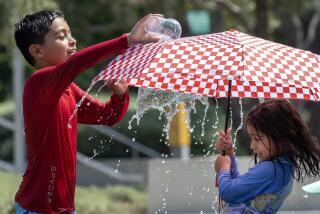BEATING THE HEAT
- Share via
* Drink plenty of fluids, such as water and juices
* Reduce physical activity and sun exposure
* When outside wear a wide-brimmed hat, use an umbrella or stay in the shade
* Avoid tight, constrictive clothing; wear natural fabrics that “breathe” such as cotton
* Use sunscreen
* Eat small, low-calorie meals
* Avoid alcohol, coffee, tea or other drinks that cause fluid loss
* Bathe or shower in cool water
* Use air conditioners or electric fans when possible. If these are not available, go to an air-conditioned library, shopping mall or movie during the heat of the day
* Do not take salt tablets unless recommended by a doctor
* If on daily medications, seek advice from your doctor concerning the combined effects of heat and these medications
* Park the car in a shady area and roll down the windows to let the hot air out before getting into it
* Never leave infants, children or elderly people in unattended cars during a heat wave
NIGHT MANEUVERS
* Use an electric fan to circulate the air
* Open the windows
* Take cool showers or baths
* Wear light-weight sleep wear
* Sleep in the coolest room of the house (may not be the bedroom)
* Sleep on all-cotton sheets
* Put ice packs in your pillow
HEAT-RELATED ILLNESSES
People most at risk in hot weather are those suffering from such conditions as diabetes, heart disease, blood vessel disease, stroke, burns, alcoholism or obesity. People who have reduced capacity to sweat may also have problems in the heat, as will those with diarrhea, who can easily become dehydrated.
Hot weather such as Southern California is experiencing can cause heat-related problems including: Dehydration
Sunburn
Heat cramps
Heat exhaustion
Heat stroke
WARNING SIGNS
Heat Cramps--The least serious of the heat-related illnesses. Usually occur after exercise or physical labor in the heat
Symptoms
* Clammy or sweaty skin
* Possible weakness or nausea
* Occasional tingling in the arms and legs
* Muscle cramps, often beginning in the abdomen and legs
First aid
* Get out of the sun and into a cool place
* Lie down, drink cool, non-alcoholic liquids
Heat Exhaustion--The most common of the heat-related illnesses. Brought on by excessive sweating (loss of body fluids)
Symptoms
* Profuse sweating
* Weakness, dizziness or feeling faint
* Rapid pulse
* Headache
* Nausea
* Dim or blurred vision
* Pallor; cold, damp skin
* Extreme tiredness
* Feelings of apprehension
First aid
* Lie flat with head down
* Restore fluids by slowly drinking liquids
* Gently apply wet towels to body
Heat Stroke--The most dangerous heat-related illness. Requires emergency treatment. Often the victim can no longer sweat and needs immediate help to reduce body temperature and prevent damage
Symptoms
* Body temperature of 104 degrees and higher
* Headache
* Weakness or dizziness
* Possible diarrhea
* Hot, dry or reddened skin
* Confusion
* Agitation
* Rapid pulse
* Staggering
* Sudden loss of consciousness
First aid
* Call for emergency help immediately
* Remove as much clothing as possible and sponge victim’s skin with cool, not cold water, until medical help arrives
SOURCE: L.A. County Health Department,
Associated Press


